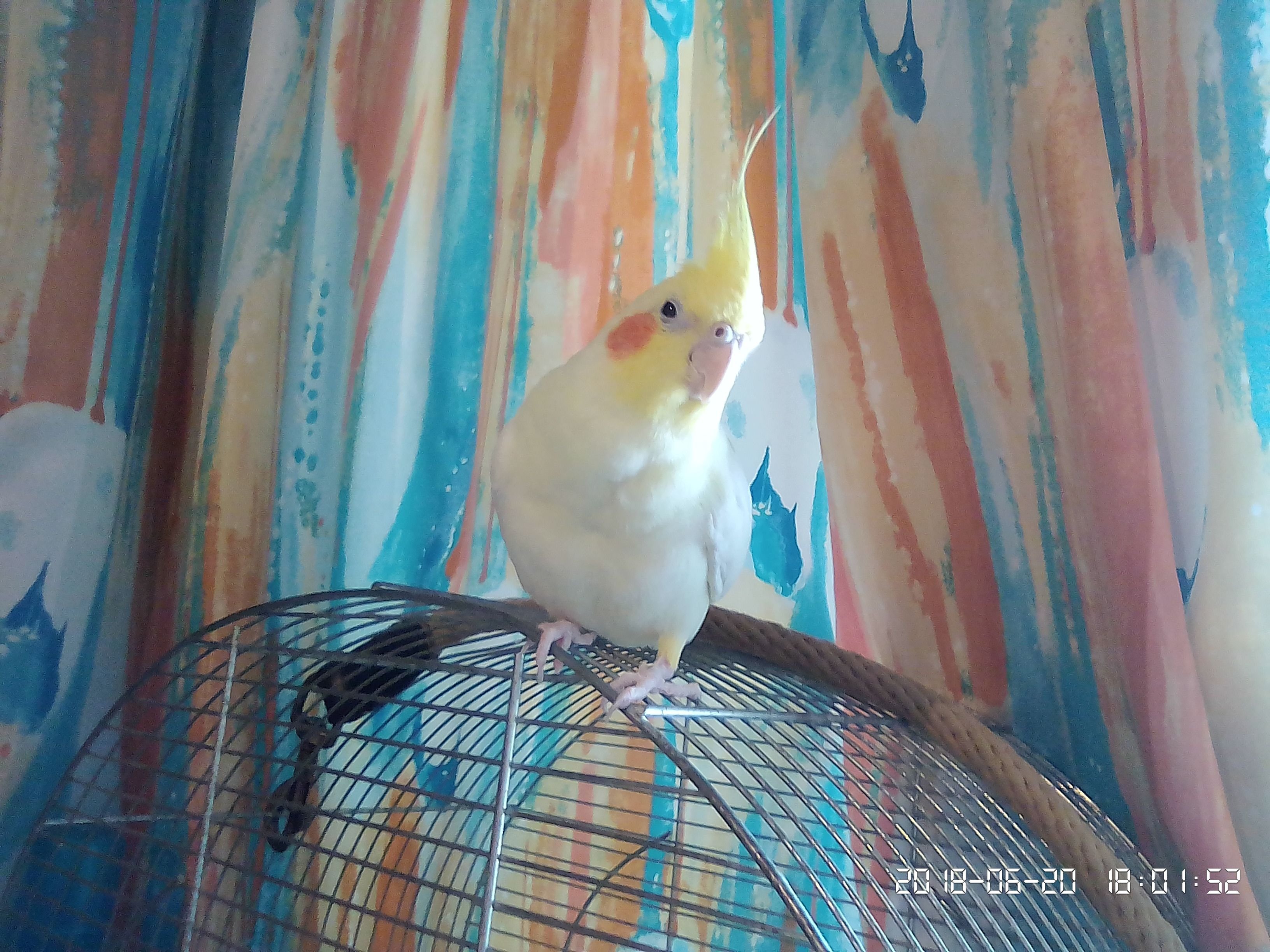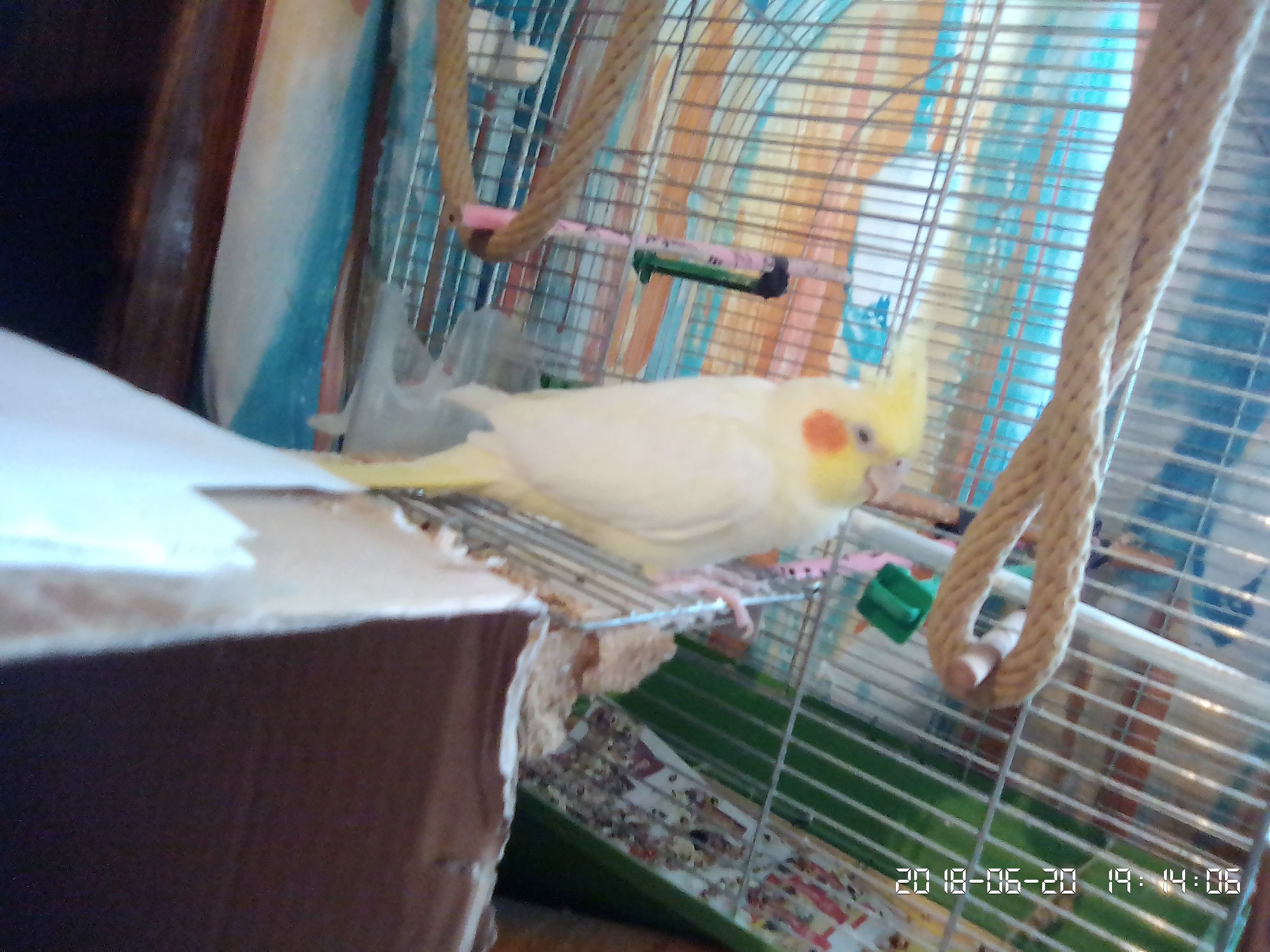
As you may know from my previous parroty serial, I am a happy prisoner of an edgy and crazy flying pile of distress, or in short, a cockatiel which I saved from a previous unfortunate life spent in a small cage.
I rarely talk about my special 'animal connection', but it seems I have a sense for pets and animals because they seem to thrive and advance in many things faster than it might be expected.
Having a parrot for me was like having an extraterrestrial, but after a few hundred tutorials and some instructions I managed to catch most of the ropes ( still a lot of learning is waiting...) and understand my flying pal.
My parrot is still paranoid and suspects in every move I make, but as you can see he is outside of a cage and he is more than happily spend most of a day - inside of it.
Before I got a parrot, I knew nothing about them besides than like any other animal it needs care, understanding, and a company.
These are the ten things I didn't know about the cockatiels before I got one.
1. A parrot will not bite me unless I directly grab it. He usually ticks with his beak or grabs and let go.
Our parrot never flew in his life before so after a few stupid accidents I trimmed his huge flying feathers ( Disclaimer - feathers are already almost regrown because I feed him really well, so he can fly just not 200 miles per hour and stiff like a paper plane...), and now he is flying much better, but still doesn't want to.
So, when he needs to go back into his cage over my writing desk, he refuses to hop back up or me to help him. Lately, I finally managed to get his Majesty to stand on my fingers till I carry him back into his cage. Of course, all with a lot of boasting, squeaking and after at least 10 minutes of nervous walking and avoiding my offers to carry him... He uses his beak more for the intimidation and as the third leg than for an actual attack.
Parrot never bit me.
2. In some countries to have a pet like this, you will need to have a special permit.
I didn't know this, but in some countries, the citizens have to have a special permit because there are so many smugglers who sell these exotic birds.
In a country where I am from, we do not require to have a permit for keeping the exotic birds, fish, lizards or reptiles. People who are professional breeders and sell animals have to provide the bill, pay tax and provide a certificate that a bird is healthy.
We also can't travel abroad with our pet, if we do not have a special permit for import/export.
Unlike in the western countries, I found out that this kind of a pet parrot is really cheap in my country so people have no value to smuggle these birds and sell it here.
3. The cockatiel has an extreme sense of hearing and vibration detection.
I was surprised to know that his senses are even better than the ones my cat has, and I always believed that the cats dominate in that department.
HIs eyes are much, much weaker and that can even cause him to get scared of something he sees, but it doesn't pose any danger.
Other things, like hearing and vibrations, are necessary for flying and communication, so he has those things better developed.
4. Parrot feels more secure and safe inside of a cage than outside of it.
Even if he hates me touching him or - don't even think of this - petting him, he enjoys spending his time just next to me, on his platform. Of course, I place all the gifts and special treats there, but even without that, he likes to sit there and observe what I am doing.
When he is sleepy and tired, he prefers going into his cage to have a nap. Every night around 9, he starts to produce nervous chirps and pull his foot with various 'facial' expressions - which in his language means that I should go away. He also accompanies that with a serial of forced yawns. It looks very funny.
All other parrots also like to spend their sleeping time inside of the cage and can be pretty stubborn to leave it.
5. If they don't learn how to fly at the early age, probably they will never learn how to do it in a right way.
My parrot was constrained in a small cage for most of his life and he forgot how to fly or never flew in his life. After two weeks of crazy acrobatics, we gave him the wings of a young bird by trimming the flying feathers and he soon calmed down and become more accurate in landing and taking off.
Even now when his wings are much stronger ( he can fly) and he can fluff around us, he pretty much chooses not to and rather just walks then flies.

6. They can eat meat.
There is some food that is not advisable to give to the parrots, cockatiels are not the exception. But, to my surprise, I found out that they can really eat meat, as they are - omnivores.
My parrot enjoys fresh bread and loudly demand it - he dances a parrot dance - whenever he sees me carrying my lunch. Now he found there are other types of food, so whenever he shows any interest I give him a bit to try it.
7. Cockatiels are the messiest of them all.
They have bird dandruff, produce tonnes of garbage, pluck redundant feathers and in general treat their environment like a junkyard. Incredible how it sounds but this little bird create so much trash. If you have any kind of an allergy or you just don't appreciate things like seeds flying around it is better to restrain yourself for getting such a pet.
The best thing is to get one of those handheld vacuum cleaners and just scoop seeds and crisps when they end up in a place you don't want them and that is it. I never noticed that my parrot minds a vacuum cleaner, even if it was very loud.
8. Each parrot is unique, so some of them can be really nice while others are not.
I was reading and comparing some other cockatiels to my own, but it turns out that because this bird is highly intelligent and each specimen has a unique temper and personality.
For example, my parrot is really paranoid and a little bit crazy, he does all kind of the things and in many occasions ends up hanging upside down or falls on my keyboard or even lands into my coffee.
But, he is usually very quiet and enjoys just sitting next to me on his platform watching me write.
9. They can live really long
I know that the bigger parrots are long living, but I have no idea that a small bird like a cockatiel can live from 15 to 29 years or more with the good care.
If you are a bit irked if you parrot cockatiel still doesn't show any signs of voice emulation or doesn't speak, don't worry, you have enough time to train it.
Oh, yes, they become really coy and smart with the age, for example whenever I grab my camera to record a fresh mischief, my parrot slips into an innocent pose and pretends he is all sugar and honey for me...
And ... half of my papers have holes.
10. Cockatiel's age is hard to tell
The birds don't age like us humans and other mammals. They pretty much remain young and functional, until the final moment.
To determine an age of a bird you have to go to the avian veterinary for him to determine the bird's age based on the inside structures of a beak.
All pictures are originally mine and uploaded only to Steemit.
Previous posts about our parrot
- GIFTS OF KARMA - INTRODUCING OUR NEW FAMILY PET - LUTINO COCKATIEL (5/1/2018)
- OUR COCKATIEL PAL IS GETTING USED TO THE NEW HOME(5/2/2018)
- PARROT'S LIFE - LEARNING ROPES AND NEW THINGS(5/4/2018)
- PARROT'S LIFE - GALS AND GENTS I THINK WE MIGHT HAVE A NAME(5/6/2018)
- PARROT'S LIFE - PESKY ... LITTLE ... FATHERLY ... NASTY ... FLYING ... MINI... ROOSTER (5/10/2018)
- PARROT'S LIFE - SO, HE CAN EAT OUT OF A HAND, RIGHT! (5/14/2018)
- PARROT'S LIFE - COACKATIEL, ALLERGIES AND SOME OTHER DETAILS (5/15/2018)
- PARROT'S LIFE - AFTER 26 DAYS WITH US PREVIOUSLY MISTREATED PARROT IS EATING OUTSIDE OF A CAGE(5/26/2018)
- PARROT'S LIFE - FIRST FLIGHT WAS ALL I EXPECTED... HE'S FURIOUS (5/27/2018)
- PARROT'S LIFE - WALK AWAY AND LET ME SLEEP HUMAN!! (5/28/2018)
- PARROT'S LIFE - ONE MONTH AFTER - PREVIOUSLY MISTREATED PARROT FINALLY CALM SPENDING DAYS OUTSIDE (5/28/2018)
- PARROT'S LIFE - GETTING SLOW-WINGS, DESTROYING MY NOTE STICKERS AND RE-LEARNING TO FLY (6/09/2018)
Thank you for reading and visiting my blog!

